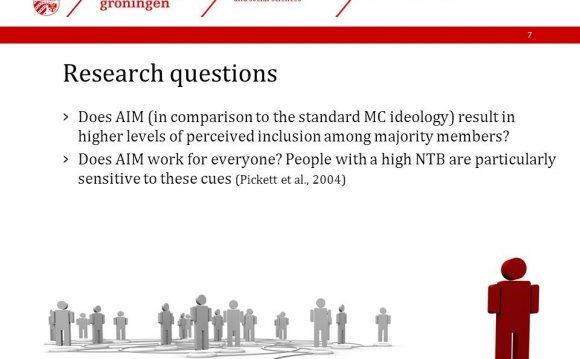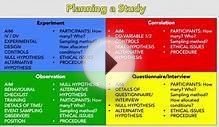
Another way of differentiating among experimental hypotheses is to contrast directional and non-directional hypothesis. A directional hypothesis is more specific, in that the experimenter predicts, not only that a specific relationship will exist, but, further, the direction of that relationship. For example:
- non-directional: I predict that arousal and test performance will be significantly related.
- directional: I predict that, as arousal increases, test performance will decrease.
Finally, we can also differentiate hypotheses that imply causality vs those that are relational. A directional and causal hypothesis is the most specific of those discussed so far. (We will address the topic of causality in research design in much more detail in future lessons.)
- relational: I predict that, as arousal increases, test performance will decrease. (Note that all of the example questions/hypotheses thus far have been relational).
- causal: I predict that anxiety causes/leads to poor performance on tests. (As we'll see in future virtual lectures, in order to truly address causal hypotheses, a more stringent research design possessing certain characteristics is required).
As you might have already surmised we can think of these different types of experimental questions/hypotheses on a continuum from least specific/stringent to most specific and stringent.
Further, the greater the specificity, the less likely we are to find our predicted results just by chance. This is why, for example, we can be more confident of research results that are consistent with a causal-directional hypothesis, than is the case of findings that are consistent with a non-directional hypothesis. More specific and stringent predictions are used more frequently in areas in which a great deal is already known, while less stringent predictions and questions are more common in "exploratory" studies, in areas where a great deal is not known.
We can actually think of these aspects of research questions and hypotheses as three variables, each with two levels, as we discussed in the variables tutorials. What's more we can examine the relationship among these "variables" by viewing them in the form of two, two by two (2 x 2) matrices. This is illustrated below with example questions and hypotheses based on the two variables "stress" and "health". However, it is not possible to come up with an example for each cell of these matrices because it is not possible to propose a non-directional and causal hypothesis. One of the preconditions for establishing causality is directionality. In order for one event to cause another event, the former must precede the latter in time.
Questions
|
relational |
causal |
|
| non-directional | Are stress and health related? |
Causal hypotheses must be directional. |
| directional | Are stress and health inversely related, such that health decreases as stress increases? | Does increased levels of stress lead to decreased levels of health? |
Hypotheses
| I predict that stress and health are related. | ||
| I predict that stress and health are inversely related, such that health decreases as stress increases. | I predict that increased levels of stress will lead to decreased levels of health. |
Psychology World was created by Richard Hall in 1998 and is covered by a creative commons (by-nc) copyright
Share this Post
INTERESTING PSYCHOLOGY VIDEO













